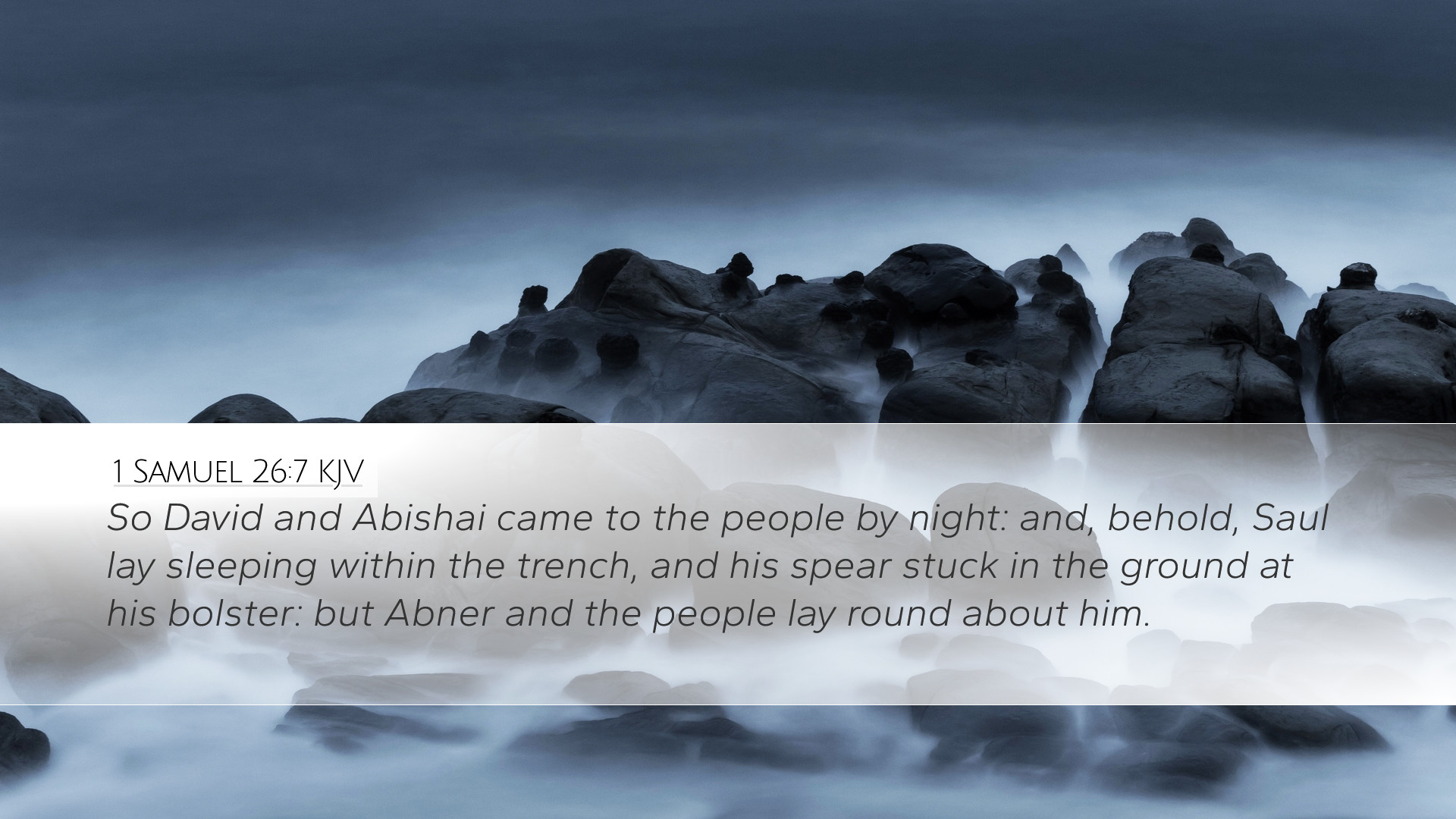Commentary on 1 Samuel 26:7
1 Samuel 26:7 states: "So David and Abishai went to the people by night: and, behold, Saul lay sleeping within the trench, and his spear stuck in the ground at his bolster: but Abner and the people lay round about him." This verse illustrates a critical moment of tension and opportunity in the unfolding narrative of David and Saul.
Contextual Overview
This passage is set against the backdrop of David's fugitive years, as Saul relentlessly pursued him. David's flight and Saul's jealousy exemplify the trials faced by God's anointed. David's encounter with Saul during the night reveals profound themes of mercy, providence, and the moral dilemmas faced by leaders.
Insights from Matthew Henry
Matthew Henry emphasizes the providential nature of this encounter. He notes that it was by divine allowance that Saul found himself vulnerable, illustrating that God often places leaders in positions where their actions reveal their true nature. Henry points out:
- Divine Sovereignty: God orchestrates events, allowing David to confront Saul directly while ensuring Saul's deep sleep, symbolizing spiritual slumber in the face of divine justice.
- David’s Restraint: David’s decision not to kill Saul despite having the opportunity reflects profound moral integrity and a deep understanding of God’s anointed status.
- The Role of Abishai: Abishai's eagerness to eliminate Saul highlights human tendencies towards violence and haste in judgment, contrasting with David's patience and wisdom.
Insights from Albert Barnes
Albert Barnes provides a scholarly analysis emphasizing the political and military significance of this event. He reflects on the dynamics of power at play:
- Military Strategy: Barnes underscores that David's stealthy approach symbolizes military cunning and strategic acumen, positioning him as a capable leader for Israel.
- Reflection on Authority: The verse asks the question of authority and leadership; Saul's sleeping state serves as a metaphor for failed leadership and the resultant chaos that follows.
- David as a Servant Leader: Barnes highlights that David’s respectful treatment of Saul exemplifies the qualities of a servant leader, contrasting with Saul's jealousy and tyranny.
Insights from Adam Clarke
Adam Clarke offers a perspective that considers both theological implications and practical applications of the passage:
- Night as a Symbol: Clarke discusses the night setting, suggesting it symbolizes the moral darkness surrounding Saul's ambition and David’s righteousness.
- Choice and Consequence: The choice before David embodies the conflict between human desire for revenge and the call to righteousness, illustrating that the path of integrity often requires significant sacrifice.
- God’s Protection: Clarke notes that David's preservation from harm and his ability to get close to Saul reflect God’s continuous protection over the righteous, reinforcing the theme of divine providence.
Theological Themes
This verse encapsulates several key theological themes that are foundational for understanding biblical leadership and ethics:
- Mercy vs. Vengeance: David's decision to spare Saul serves as a profound lesson in mercy. It challenges believers to reflect on the nature of their responses to those in authority, especially when wronged.
- The Nature of Kingship: Saul’s vulnerability invites profound questioning regarding the nature of power and authority—whether it stems from divine appointment or personal ambition.
- Trust in Divine Timing: David’s choice to wait for God's timing instead of seizing the moment draws attention to the importance of patience and faith in navigating life’s predicaments.
Application for Today’s Leaders
For pastors, students, and theologians, the insights drawn from 1 Samuel 26:7 carry weighty implications:
- Exemplifying Integrity: Leaders must strive for integrity in decision-making, especially when faced with temptations to retaliate or exploit power.
- Reflecting on Personal Ambitions: This passage invites an internal examination of one's motives—are ambitions aligned with God's will, or are they driven by personal gain?
- Cultivating Patience: Cultivating patience in the face of trials and the actions of others allows for greater understanding of God’s overarching purposes and plans.
Conclusion
1 Samuel 26:7 serves as a profound illustration of the complexities of leadership and the necessity of character in God's calling. It urges leaders to act with mercy, to depend upon God’s sovereignty, and to trust his timing. As believers engage with this text, they are encouraged to reflect deeply upon their responses to authority and to seek the heart of God in their own leadership journeys.


